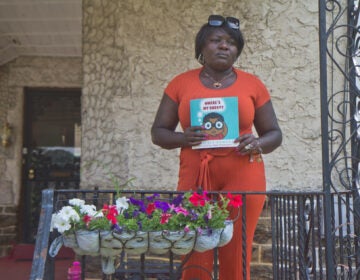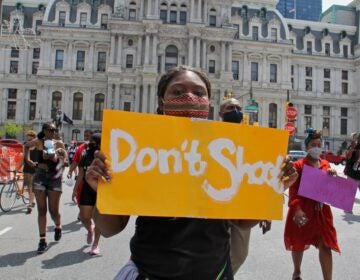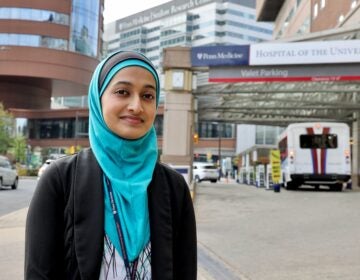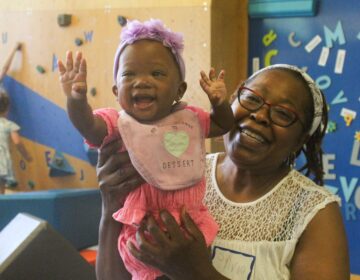Philly battles two public health crises
Philly is battling two public health crises: COVID-19 and an escalating gun violence epidemic. These two crises may be related and have communities of color reeling.
Listen 17:23
Colwin Williams with Cure Violence tells Simpson Street residents that officials are putting a bandaid on the problem and not dealing with real issues surrounding gun violence. An emergency meeting was called on August 6, 2020, after 7-year-old Zamar Jones was fatally shot. (Kimberly Paynter/WHYY)
Philadelphia is hurting. Not only is the city fighting a global pandemic, but it’s also battling an escalating and deadly epidemic of gun violence. The number of people shot in Philadelphia continues to rise to historic levels, and many in that number are children. On top of it all, it’s largely affecting Black people who are at a greater risk for getting COVID-19.
WHYY criminal justice reporter Aaron Moselle, explains how these two public health crises may be related, what the city is doing about it and how families are coping.

Hear the whole story on The Why
Interview highlights
Tailynn Davis, mother of shooting victim Robert Wood, on her son’s last moments
I just know that when it happened, a young man, I guess, that lived in a neighborhood heard the commotion outside. When the cops got there, the young man rode with my son in the cop car for them to rush him to the hospital. And the young man told us he looked in his eyes and he told him, “Tell my family I love them.” And he closed his eyes.
Aaron on how the pandemic may be related to the rise in gun violence
Police speculate that the pandemic has played a part in what we’re seeing. There are fewer people on the street — people are just not out and about as much as they were. And so the impact that has is that there are fewer people on the street to witness crimes and that potentially emboldens people who who would be shooting to shoot, because they’re not as worried about someone witnessing that shooting.
Beyond the police level … academics also say that the pandemic has just kind of laid bare a lot of longstanding inequities that have always been known to drive gun violence — poverty and lack of job opportunities and, you know, poor public education and the need for more affordable housing — all the stuff that if people had, they might be less likely to turn to crime … And actually, there was a Penn study that was done looking specifically at the first six weeks of the pandemic … And what they found was that in neighborhoods that had higher rates of gun violence, there was also higher rates of COVID.
On what Philly is doing to address it
They put out last year a five-year plan to reduce gun violence. It talks about the need to increase graduation rates and reducing truancy, creating job opportunities for at-risk youth. There’s also sort of lower level goals, you know, cleaning and greening vacant lots and enforcing property via violations in neighborhoods that are at high risk for violence, reducing blight. So it’s it’s aimed at not just addressing the shootings themselves in terms of a law enforcement approach, but looking at all the other things that kind of contribute to to what we’re seeing right now.
And they’ve also launched this new program called Group Violence Intervention. That program launched in August. The way that this program works is that they have conversations with these participants. There’s about supposed to be about 30. And they sit them down. They say, “Hey, this gun violence needs to stop.” But that message also comes with an offer of help. So a substantial amount of the budget for the program is geared towards providing these residents with social services and mental health services and connecting them with job training …
We should note that even though the program just launched and it’s still up in the air about how impactful it will be, the program has already come under fire a bit from City Council … who were really concerned after a hearing … there were still some pretty key hires to be made with regard to the program. To them, that signaled a lack of urgency in the city’s part in getting this program going and putting its best foot forward. And it’s not just lawmakers who want to see more urgency … There are plenty of residents we have heard from … that are really demanding action.
WHYY is your source for fact-based, in-depth journalism and information. As a nonprofit organization, we rely on financial support from readers like you. Please give today.








